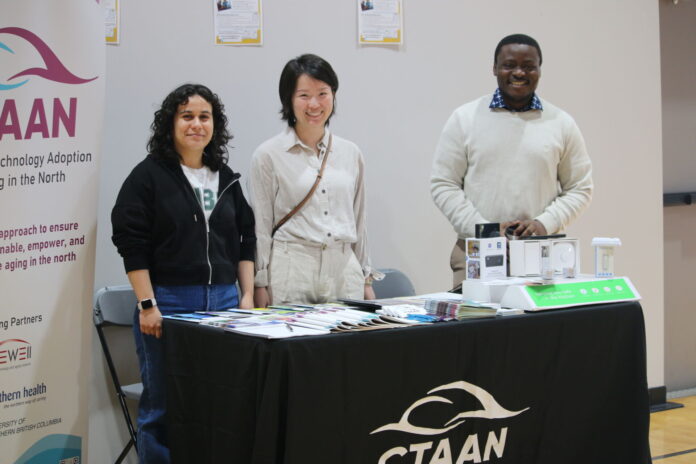A UNBC lab is looking to break barriers when it comes to bringing together technology and those living with dementia and their caregivers.
“The focus of CTAAN is to help older adults in the north find technology more accessible,” said Isaac Adedeji, Research Manager with CTAAN.
“CTAAN started out during the pandemic, and the vision was really to support older adults in the north to have technology, use technology, but the much is the complexities and the realities of living in the north.”
Researchers from CTAAN were set up with a display at the 2025 IG Wealth Management Walk for Alzheimer’s with a goal of introducing these technologies to people with dementia and their caregivers.
“We’re also trying to introduce our project, and trying to get people to know about our project, and maybe to participate in it,” said Miao Li, a Research Assistant with CTAAN.
“Basically, we’re trying to tell people what we’re doing, and how we can help people, older adults living in a rural area.”
Laura Rodriguez, a Research Associate with the lab, noted they are currently recruiting for a year-long study for the Centre of Technology Adoption in BC, which is examining the impact of remote monitoring to support older adults to age in BC.
“The study will imply for the caregiver to participate actively, and the care recipient will have a completely passive role, they just need to have installed in their homes the monitoring devices,” she explained.
“With this study, what we aim to gather is the perspectives of the caregivers. What has happened during this year-long study? Has the monitoring device helped them at all? Has this not helped? What needs to be improved, and how can it be implemented within the policies in the health authorities?”
Those interested in participating in the study can contact the lab.
Adedeji added CTAAN works with a wide range of technologies.
“We have actually been able to test and trial in the north because of the very wide range of collaborations we have across Canada,” he explained.
“We’ve had to test home monitoring technologies, we’ve had to test wound-management technologies, and all kinds of technologies that older adults really need to support their daily living.”
Adedeji said they have a ‘live-in lab’ for older adults to see how these technologies work.
“We invite the community, older adults, care partners and caregivers of people living with dementia to come into the lab and see what we’re doing,” he said.
Adedeji noted CTAAN has grown significantly with a number of projects and with a number of collaborations with organizations such as the Ministry of Health and the Alzheimer’s Society of BC.
“It’s been an amazing process of helping technology developers, innovators, to really help them get the tech to work within the northern communities, get the perspective of older adults living in those communities, and to help them make sense of how to make the technologies accessible to older adults who live in remote areas, like this, where the technology is not really in the best place, internet is not really in the best place, support systems and infrastructure is not really in the best place,” he said.
“CTAAN is just doing what we can to be able to make sure that those technologies match the needs of older adults living in the north.”
Rodriguez said one of the challenges in getting these technologies to those remote communities is involving health care professionals.
“The north tends to be short-staffed, in personal and especially in nursing, frontline healthcare workers, there’s usually that gap. Technology, of course, it can work by itself, the data the technology collects needs to be revised by some healthcare professional,” she explained.
“Then of course there’s the Wi-Fi, as Isaac previously mentioned. Most of the technologies that are available right now, in order to pass on that information that it’s collecting, it needs Wi-Fi, to, let’s say a live-time assessment of what is going on with the person.”
Rodriguez added acceptance of these technologies is a barrier as well.
“For example, a lot of the technologies we have include the use of AI, which for some people is still a taboo topic, some people don’t trust in AI,”
“What we also want for people to understand is that there’s friendly types of uses of AI, not all will invade in their personal information, some of them will have a very good supporting system regarding confidentiality.”
Something going on in the Prince George area you think people should know about?
Send us a news tip by emailing [email protected].







